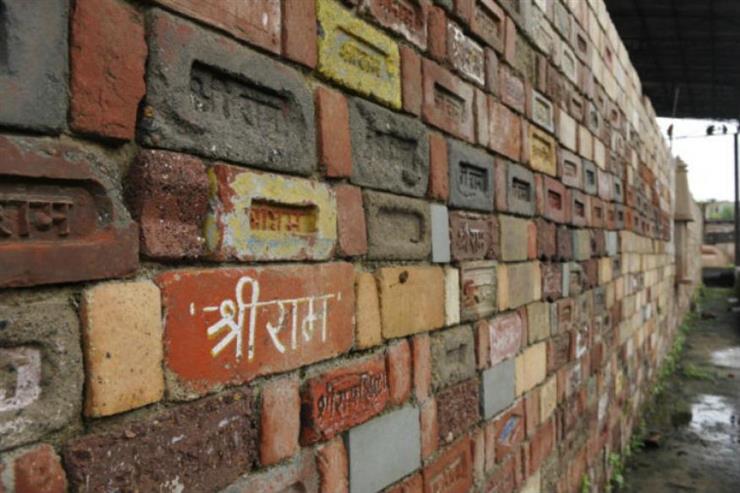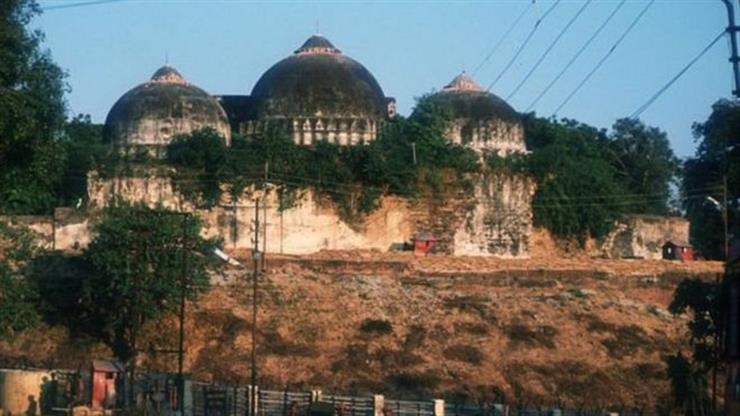We should respect the judgment of the Supreme Court without trying to fit it into the landscape of justice and fairness as explained by Rawls. It is a closure of something perniciously erosive to the idea of India, the idea to which we all owe our allegiance.
By Shah Alam Khan
The Ayodhya verdict, given by a bench of five judges of the Supreme Court including the Chief Justice of India, hopefully, brought an end to this long-standing dispute.
I was a 22-year-old medical student when a group of thugs climbed the dome of the Babri masjid in Ayodhya and reduced it to a grey pile of rubble on December 6, 1992. Having been brought up in a liberal democracy, I was devastated at this blatant brutality and violation of the Constitution, and that too with the tacit collusion of the state. It was painful, probably because it happened in an India which believed in the virtues of liberty, secularism and pluralism.

Bricks staged at Ayodhya for construction of Ram Mandir
As we ascended in our national quest to achieve the goals of neo-liberal economics, India evolved. And we lost ourselves to more trysts with bigger brutalities and even bigger national tragedies which claimed our consciousness. We became aloof to the sufferings of the poor, the marginalised, the underprivileged and minorities. We kept on erecting more and more tombstones in the cemetery of that liberal democracy, which we had decided to once nurture when we became independent in 1947. In evolutionary terms, we did lose our tails, but in the bargain we developed fangs full of poison for the deprived masses of the land.
. It is not a time to celebrate or mourn this judgment. It is a time to be alert to the idea of justice, to the idea of inclusion, to the idea of democracy and, most importantly, to the idea of peace. In the words of the Dutch philosopher Baruch Spinoza, peace is not the absence of war, it is the presence of justice.. It is not a time to celebrate or mourn this judgment. It is a time to be alert to the idea of justice, to the idea of inclusion, to the idea of democracy and, most importantly, to the idea of peace. In the words of the Dutch philosopher Baruch Spinoza, peace is not the absence of war, it is the presence of justice.. It is not a time to celebrate or mourn this judgment. It is a time to be alert to the idea of justice, to the idea of inclusion, to the idea of democracy and, most importantly, to the idea of peace. In the words of the Dutch philosopher Baruch Spinoza, peace is not the absence of war, it is the presence of justice.
On November 9, a closure happened for one of the tragedies which had marred our consciousness. The Ayodhya verdict, given by a bench of five judges of the Supreme Court including the Chief Justice of India, hopefully, brought an end to this long-standing dispute. The unanimous verdict pronounced that the disputed land in Ayodhya will go to a government-monitored Trust to build a temple, and the Muslims will get a separate five-acre piece of land in the city at some “prominent” site. Although it is still in its early days, the verdict is being hailed as prudent and practical. There is little resistance and mention of the fact that the verdict, in a way, has vindicated the brutality which was unleashed on the disputed structure in 1992. If, in 1992, there were whispers of correcting the wrongs of the past, in 2019 there are rumblings that the past stands corrected.
The India in which I grew up was, by and large, ashamed and felt guilty of doing what it did to the Babri masjid in 1992. Having said that, even at that time a fringe celebrated the demolition of the mosque. However, though that fringe had political faces and common men as supporters, they did not get the kind of acceptance they had wished for. There were momentary political gains for many, but there was a general resistance to the idea of hatred. In 2019, that fringe has taken centre-stage. They now rule our consciousness. They decide what is wrong and, more importantly, what is not. Hatred is acceptable. The evolution from demolishing century-old structures to breaking human skulls is complete. Lynching of fellow citizens, bail to proven thugs like Babu Bajrangi and Maya Kodnani, detention of human rights activists, demands for awarding the killers of Gandhi, bail for the killers of Dalits in Khairlanji — we have definitely come a long way. The tortuous route that the republic has taken to arrive at where we rest today is exceptionally unique. In a way, it is our tryst with destiny, as claimed by Nehru in the famous midnight speech. It is never easy to defeat destiny.

Babri Masjid demolished for construction of Ram mandir
As a common Indian, I am happy that the Supreme Court judgment has brought closure to a long-standing dispute which vitiated the atmosphere of the country for so long. But, as a liberal in a democracy and citizen of the broader world, the ache of the judgement’s arbitrariness is like a thorn in my heart. The idea of justice is based on the perception of fairness. John Rawls, in his seminal work, A Theory of Justice, said that all people have a claim to as much freedom as is consistent with everyone else having an equal level of freedom. This is an important concept towards understanding both justice and freedom. According to him, freedom and equality can be integrated and, thus, justice can be presented as fairness. With this verdict of the Supreme Court, I am not sure if justice can be outlined as per Rawls’s definition. Justice and fairness seem to be separated at the seam in this case. This open seam, like an open vein, can bleed a society white. Justice as fairness for just a few, can erode societal norms.
We should respect the judgment of the Supreme Court without trying to fit it into the landscape of justice and fairness as explained by Rawls. It is a closure of something perniciously erosive to the idea of India, the idea to which we all owe our allegiance. To be honest, our worry lies not in this verdict, but the verdicts which can come in the future. It is not a time to celebrate or mourn this judgment. It is a time to be alert to the idea of justice, to the idea of inclusion, to the idea of democracy and, most importantly, to the idea of peace. In the words of the Dutch philosopher Baruch Spinoza, peace is not the absence of war, it is the presence of justice.
This article first appeared in the print edition on November 16, 2019 under the title ‘Separated at the seam’. The writer is professor, department of orthopaedics, AIIMS, New Delhi. (Views are Personal)
Ayodhya verdict brings an end to this long-standing dispute, not fair to all
We should respect the judgment of the Supreme Court without trying to fit it into the landscape of justice and fairness as explained by Rawls. It is a closure of something perniciously erosive to the idea of India, the idea to which we all owe our allegiance.